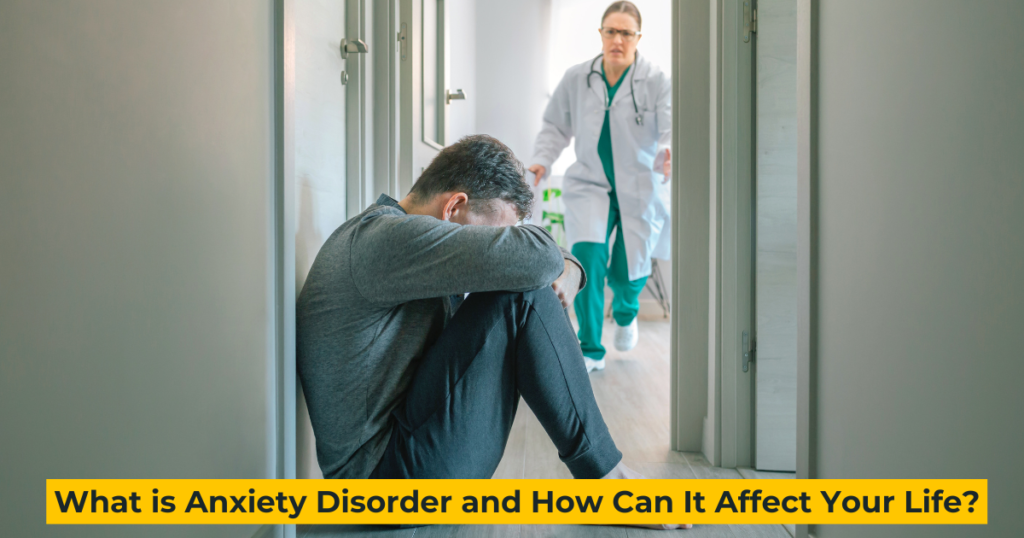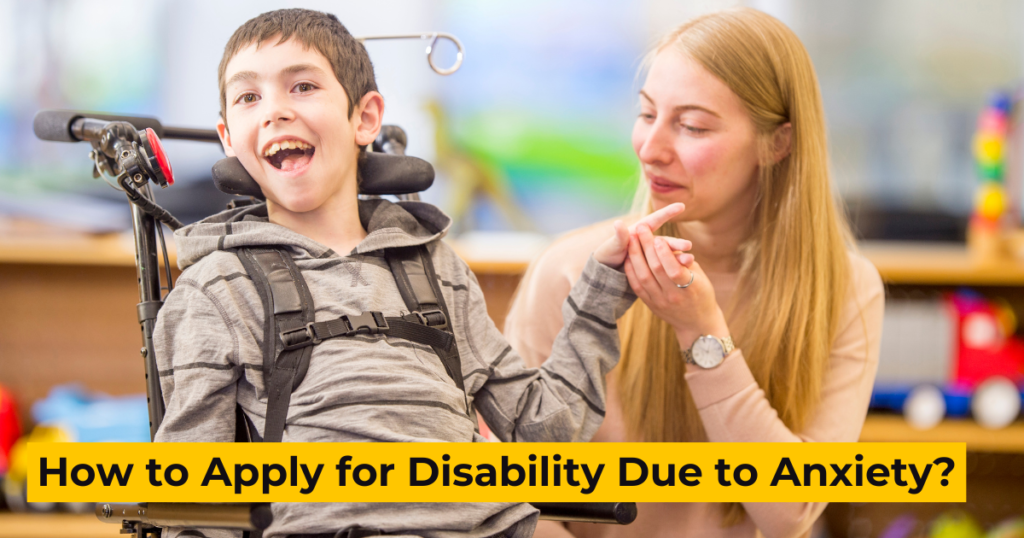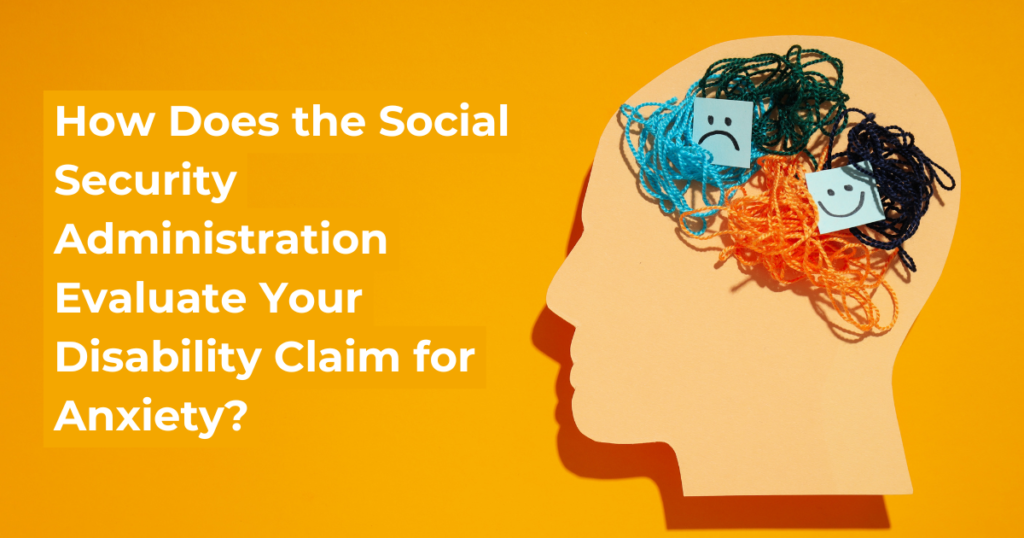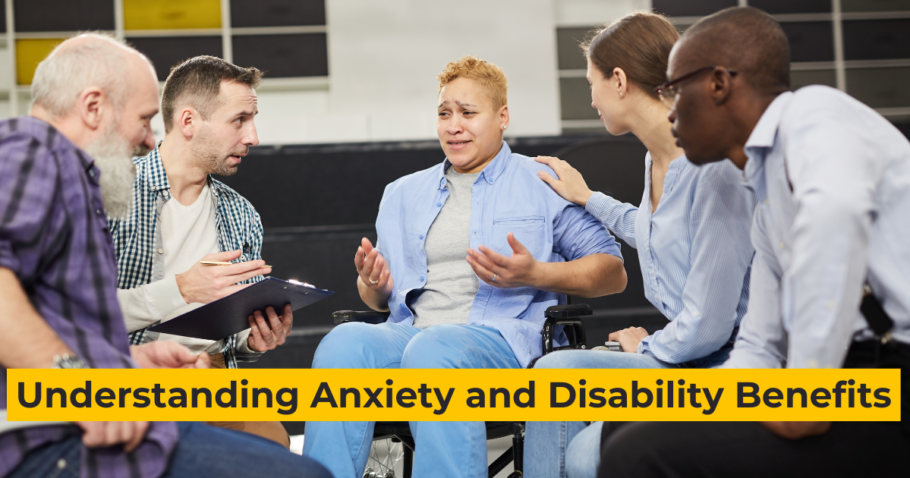Introduction: Understanding Anxiety and Disability Benefits
Disability for Anxiety is a topic that affects millions of people around the world. Anxiety disorders are among the most common mental health conditions, and they can be deeply disabling. People who suffer from anxiety may experience severe symptoms that interfere with their ability to work, socialize, or even perform daily tasks. When anxiety becomes so debilitating that it prevents an individual from functioning normally, they may qualify for anxiety disability benefits.
The Social Security Administration (SSA) recognizes that anxiety can have a significant impact on one’s life, and they offer disability benefits for anxiety in cases where the condition meets certain requirements. In this blog, we’ll explore whether you can qualify for disability benefits due to anxiety and how the process works. Whether you are dealing with generalized anxiety disorder (GAD), panic attacks, or any other form of anxiety disorder, understanding how the SSA evaluates your claim is crucial.

What is Anxiety Disorder and How Can It Affect Your Life?
Anxiety disorder disability claims are often based on the severity of the symptoms and their impact on daily life. Anxiety disorders are characterized by excessive worry, fear, or unease that doesn’t go away on its own. These conditions can take many forms, including:
- Generalized Anxiety Disorder (GAD): Constant, excessive worry about a range of issues.
- Panic Disorder: Recurrent and unexpected panic attacks.
- Social Anxiety Disorder: Intense fear of social situations.
- Post-Traumatic Stress Disorder (PTSD): Anxiety resulting from trauma or extreme stress.
For someone suffering from an anxiety disorder, simple tasks like going to work, attending social events, or even leaving the house can be overwhelming. This is where anxiety-related disabilities come into play. When anxiety disrupts one’s ability to function in society or at work, it may qualify as a disability disorder.
The severity of anxiety symptoms can lead to an inability to work or maintain normal relationships, thus making it a disabling condition. Anxiety-related disabilities often require long-term treatment and therapy, making it even more challenging for individuals to engage in day-to-day activities. Therefore, recognizing how anxiety affects daily life is a key factor in determining whether someone can qualify for disability benefits.

Can You Qualify for Disability Benefits with Anxiety?
One of the most common questions people ask is: Can you qualify for disability benefits with anxiety? The answer depends on various factors, including the severity of the symptoms and their impact on your ability to function. Disability claim for anxiety is evaluated by the Social Security Administration (SSA) based on a few key criteria:
- Severity of Symptoms: Your anxiety symptoms must be severe enough to prevent you from working or performing daily tasks.
- Duration of Symptoms: Anxiety must have been present for at least 12 months or is expected to last that long.
- Medical Evidence: You need to provide evidence of your anxiety, such as medical records, therapy notes, and diagnoses.
If you can prove that your anxiety meets these criteria, you may be eligible for anxiety disability benefits. The SSA evaluates claims based on the medical documentation provided, including the frequency of symptoms like panic attacks or generalized anxiety.
How to apply for disability due to anxiety and panic attacks?
In some cases, even if you have a diagnosed anxiety disorder, you may still need to demonstrate how it affects your ability to work. Anxiety-related disabilities can be challenging to quantify because they often don’t show physical symptoms. However, with proper documentation from healthcare professionals, it is possible to demonstrate that your anxiety disorder impedes your ability to perform work-related tasks.

How to Apply for Disability Due to Anxiety?
When applying for Social Security disability for anxiety, there are several essential steps to follow:
- Gather Your Medical Documentation: The SSA will require detailed records from your healthcare provider, including diagnoses, treatment plans, and any hospitalizations or therapy sessions related to your anxiety disorder.
- Complete the SSA Application: The application will ask about your work history, daily activities, and symptoms of anxiety. Be honest and detailed about how anxiety affects your life.
- Provide Detailed Personal Statements: It’s helpful to provide a personal statement outlining how anxiety impacts your ability to function. Be specific about your limitations at work and in social situations.
- Submit the Application: Once you have all the necessary documentation, you can submit your application online or at a local SSA office. Disability application for anxiety disorder can be a long and complicated process, so it’s important to have all your information in order.
If your application is denied, you can appeal the decision. Be sure to include any additional medical evidence that may help your case. This is where working with a disability lawyer can be helpful, as they can guide you through the complex appeal process.

What Are the Common Anxiety Disorders That Qualify for Disability?
Several forms of anxiety disorders can qualify for disability benefits. However, anxiety disorder disability claims will only be approved if the disorder meets the SSA’s strict criteria.
- Generalized Anxiety Disorder (GAD): Chronic, excessive worry about everyday events or activities.
- Panic Disorder: Repeated, unexpected panic attacks that cause fear of future attacks.
- Social Anxiety Disorder: Overwhelming fear of social interactions, which can impair personal and professional relationships.
- Post-Traumatic Stress Disorder (PTSD): Severe anxiety caused by past trauma that results in flashbacks, nightmares, and heightened anxiety.
The Social Security disability approval process is complex. To qualify for disability benefits, you must show that your anxiety disorder is severe enough to prevent you from engaging in gainful employment or completing basic tasks of daily life.

How Does the Social Security Administration Evaluate Your Disability Claim for Anxiety?
When the SSA evaluates a claim for anxiety, they look for a variety of factors. This includes reviewing your medical records and consulting with your healthcare provider to understand how your anxiety impacts your life. The SSA uses the Blue Book, which is a list of medical conditions that may qualify for disability benefits. For anxiety, the criteria are based on how much your condition interferes with work and daily activities.
To make sure you meet the SSA’s criteria, you need to demonstrate:
- Frequency of Symptoms: How often you experience symptoms like panic attacks or anxiety attacks.
- Impact on Functioning: How anxiety affects your ability to perform basic tasks like work, self-care, and maintaining relationships.
- Medical Documentation: Detailed psychiatric evaluations and treatment records from your healthcare provider.

Can Anxiety and Depression Be a Valid Reason for Disability?
In many cases, anxiety and depression co-occur, and both can contribute to disability. Disability benefits for anxiety may be granted when both conditions are severe enough to prevent an individual from functioning normally.
If your anxiety is accompanied by depression, it may make it even more challenging to perform work-related tasks. Many individuals with social anxiety disorder also suffer from depression, which exacerbates their symptoms and further hinders their ability to lead a normal life.
Is it possible to qualify for disability with anxiety disorder?
In such cases, the SSA evaluates both conditions together. However, you must still provide adequate evidence to show how both anxiety and depression disrupt your ability to work and perform daily activities. A comprehensive medical record will be necessary to establish the severity of your symptoms.
Conclusion: Taking the Next Steps in Your Disability Claim Process
If you believe you qualify for disability for anxiety, it’s essential to start the process early and ensure you have all the necessary documentation. Applying for disability due to anxiety can be a lengthy and challenging process, but understanding the SSA’s requirements and how they evaluate claims can increase your chances of approval.
Need help with your anxiety disability claim? Contact us for professional assistance in navigating the process.
FAQs
- Can you get disability for anxiety and depression?
- What are the most common anxiety disorders that qualify for disability?
- How long does it take to get disability benefits for anxiety?
- How severe does my anxiety have to be to qualify for disability?
- Do I need to provide therapy or psychiatric notes for my anxiety disability claim?
- Can I get disability if I have anxiety and panic attacks?
- What if my anxiety disability claim is denied?
- Can I apply for Social Security disability if I have anxiety but no other mental health condition?
- How can I prove my anxiety disorder is disabling?
- Are there any resources available to help with the disability claim process for anxiety?





